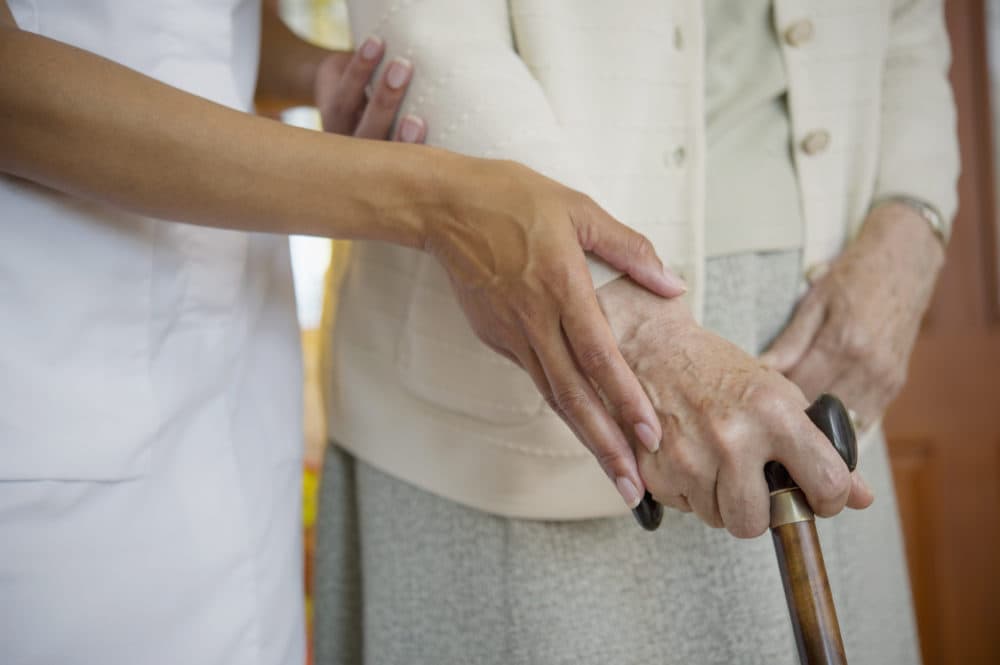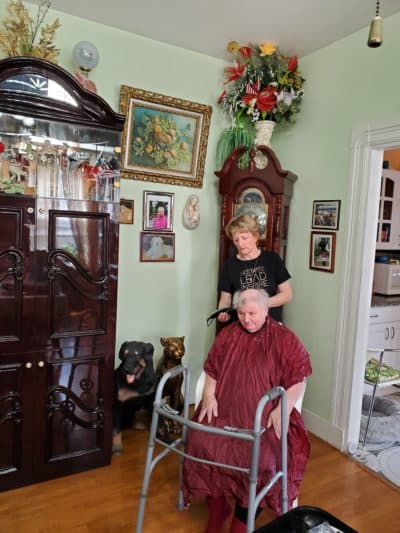Advertisement
Coronavirus Coverage
'How Long Do I Plan To Stay? As Long As It's Necessary': This Home Health Care Worker Is Quarantining With Her Client
Resume
Frontline health care workers in Massachusetts hospitals are preparing for a projected surge in COVID-19 cases over the coming weeks.
At the same time, home health care workers are fighting the coronavirus on a different front, trying to keep their clients out of emergency rooms by bringing treatment and support into the homes of the elderly and disabled.
And in some cases, home health workers are choosing to quarantine with their clients.
Anna Castillo is a personal care attendant. She's been working with her 74-year-old client, who has debilitating arthritis, for more than two years. Castillo helps her out of bed in the morning, bathes her and prepares meals.
"I'm doing the sandwich with ham and tomato. I already gave her the medication, I bathe her, dress her," Castillo says during a phone call on a recent morning.
For the past few weeks, Castillo's shifts have gone from six hours a day to 24-7.

"I'm just keeping everything under control, checking to see if she's OK, if she doesn't have no temperature," she says, "making sure that she takes her medication and all of the vitamins possible and avoid the world outside."
Castillo lives in Chelsea with her husband but decided a few weeks ago to move in with her client in South Boston to reduce the risk of carrying the coronavirus into her client's home.
She says she felt like she had no other choice — even though her paycheck doesn't reflect her new schedule.
"How long do I plan to stay? As long as it's necessary," Castillo says. "She wouldn't be able to survive on her own in here."
As a personal care attendant, Castillo is paid by Mass Health. She says she's only receiving compensation for her previous six-hour work day.
Rebecca Gutman, vice president of home care with the service workers union, 1199 SEIU, says Castillo is one of nearly 55,000 personal care attendants working in the state, a field made up largely of immigrants and women of color.
"It's heroic work during normal times and during the pandemic, there's a lot more fear among home care workers as they're going to work," Gutman says.
And, unlike Castillo, many of these workers are still commuting, often taking public transportation, living in substandard housing and getting by paycheck to paycheck.
"So, you have one vulnerable population caring for another vulnerable population," Gutman says, "and then they're going into the homes of people with disabilities and elders and doing so without personal protective equipment."
The service workers union is coordinating with the state to collect and distribute masks and gloves for home health workers but, Gutman says, it's slow going due in large part to the national shortage.
The state Department of Public Health has provided guidance for home health workers and personal care attendants, including suggestions like screening clients daily for fever, avoiding unnecessary travel and frequent hand washing.
"Given the ramp up of COVID-19 positive cases in nursing homes right now, probably the safest place for elders and people with disabilities to be right now is in their homes," says Gutman.
But, she stresses, that means home health care workers must have a way to protect themselves.
This segment aired on April 7, 2020.
